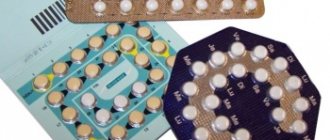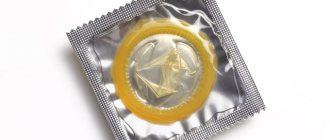There is a wide range of contraceptives on the shelves of pharmacies. Many women during their reproductive years prefer birth control pills, considering them easy to use and reliable in use.
An important aspect is that, if desired, you can easily refuse them. It is very important that when choosing a drug, a lady does not forget to take into account her age. In this publication we will look at which birth control pills are best to use after 45 years of age.
The female body after 45 years
In women over 45 years of age, changes in the functioning of the hypothalamic-pituitary system are already beginning, and ovarian function decreases. The menstrual cycle is still regular, but rapid resorption of eggs occurs, and their number spontaneously decreases. Therefore, ovulation is not possible in every cycle. Due to the absence of the corpus luteum, insufficiency of the luteal phase occurs, menstruation begins to be periodically delayed, and sometimes breakthrough bleeding occurs.
At older ages, diseases of the reproductive system and other organs accumulate, hormonal imbalances often occur, and the risk of cancer pathologies increases. Therefore, contraceptive pills should be used with caution.
Necessary conditions to start taking hormones
Hormonal therapy for women after forty should not be prescribed independently. Specialist consultation is required. To prescribe hormones, the following conditions are required:
- a mandatory visit to a gynecologist to identify disruptions in the hormonal system;
- conducting a complete blood test;
- examination of the genital organs for the presence of tumors;
- examination of the cervix for the presence of tumor markers and to study its microflora;
- carrying out tests for malfunctions in the thyroid gland;
- performing liver tests;
- visiting a mammologist to examine the condition of the mammary glands;
- conducting a blood test specifically for hormones.
If there are no contraindications to starting therapy, the doctor can advise which hormones should be taken.
Reasons to continue taking birth control pills
Many people start taking birth control pills when they are young, and after 45 years they continue to do so out of inertia. There is a plus from continuous mode. Such women reliably protect themselves from unwanted pregnancy. If conception occurs at 45-50 years of age, you can carry and give birth to a child, but the risk of severe complications increases significantly . Therefore, gynecologists recommend not planning motherhood at this age.
Birth control pills are involved in maintaining normal hormonal levels. They do not allow the development of absolute or relative hyperestrogenism, which is to blame for the following diseases:
- endometrial hyperplasia;
- endometrial polyps;
- uterine fibroids;
- endometriosis.
If you take hormonal contraceptives before and after the age of 45, you can stop the progression of these diseases in the early stages.
Mirena and uterine fibroids
One of the reasons for the development of fibroids is hormonal imbalance. There is a high probability of a tumor appearing during menopause. Uterine fibroids provoke painful, heavy periods, bleeding during menopause. The Mirena spiral evens out hormonal levels, prevents the development of neoplasms or helps reduce them. While a regular IUD is contraindicated, Mirena is recommended by doctors for the prevention of many diseases. The product regulates estrogens and prevents the development of the endometrium. Scanty menstruation may be present in the first months of treatment, then disappears altogether.
An increased amount of estrogen provokes the growth of fibroids. As reproductive functions decline, the amount of estrogen in a woman’s body decreases, but it is replenished with drugs containing a synthetic hormone. As a result, a situation arises with a high level of estrogen. The spiral allows you to balance this level. Since it contains progesterone, it is possible to use drugs with estradiol. But the treatment regimen must be selected by the doctor, taking into account the individual characteristics of the body. According to women, Mirena copes quite well with fibroids. It either remains at the same level or disappears completely.
Features and types of contraception after 45
To protect against pregnancy in women over 45 years of age, various types of hormonal contraceptives are used:
- combined oral contraceptives (COCs);
- pure gestagens, or mini-pills;
- subcutaneous implants;
- intrauterine hormonal system.
Not all methods of contraception are in demand after 45 years. Subdermal implants are not popular due to their invasiveness and the need for surgery. An intrauterine device with a hormone is recommended as a treatment for heavy menstruation, fibroids, endometriosis and endometrial hyperplasia. Birth control pills are the most popular. They are easy to dose and drink, but you need to strictly control the time of administration and not miss the next dose.
Mini-pill
Hormonal drugs for women over 45 years old from the mini-pill group are pure gestagens. They contain desogestrel. The mechanism of action is associated with thickening of cervical mucus, disruption of ovulation due to suppression of the release of LH and FSH. The endometrium does not undergo changes characteristic of the normal luteal phase. Representatives of the group are:
- Charosetta;
- Lactinet;
- Modell-mom.
Birth control pills with gestagens can be used by women who are contraindicated with birth control pills with estrogens. They are allowed to be drunk by smokers, with diabetes and pathologies of the cardiovascular system. But the contraceptive effect quickly disappears if you miss the time of taking the pill.
Combined oral contraceptives
Combined oral contraceptives after 45 years of age can be used only after a preliminary examination and consultation with a gynecologist. At this age, the number of diseases that are contraindications for birth control pills increases. Therefore, you must undergo the following examinations:
- general blood analysis;
- blood chemistry;
- coagulogram;
- mammography;
- Ultrasound of the pelvis;
- PAP test.
If the examination results are good and the woman does not have cardiovascular diseases, the doctor will select birth control pills.
Action of the Mirena spiral
T-shaped device with 2 antennae. In the body of the Mirena coil there is a cavity filled with hormones. The body receives an equal amount of progesterone daily in the form of levonorgestrel - 20 mcg. The hormone belongs to the group of gestagens. Prevents the formation of the endometrium and the growth of cancer cells. The Mirena spiral balances progestins and estrogens. Does not interfere with the functioning of the ovaries. Prevents the development of pathological processes in the pelvic organs, reduces the manifestation of menopause. Used as a means of contraception. Its effect is especially useful at the initial stage of menopause, when you can still get pregnant. The spiral thickens the discharge and prevents sperm from penetrating into the uterine cavity. Prevents the development of hyperplasia and endometriosis.
Rules for choosing contraception after 45 years
Each drug has additional effects that are often used in gynecology. When choosing contraceptives for women after 45-50 years of age, they are guided by her state of health. Mini-pills are used in the following cases:
- excess weight;
- diabetes;
- arterial hypertension;
- smoking;
- tendency to thrombosis.
Everyone else can be prescribed birth control pills from the COC group. If an ovarian cyst is detected during an ultrasound, hormonal agents are not used until confirmation is received that it is a benign formation.
For mastopathy, long-term use of birth control pills is beneficial. The pills will only cause harm if there is a precancerous disease of the mammary glands or uterus.
Contraindications
As you know, any drug can cause not only benefit to the body, but also harm. Possible harm to the body occurs if a woman has contraindications to taking hormonal medications.
List of main contraindications:
- Frequent headaches.
- Excess weight.
- Frequent inflammatory diseases, especially diseases of the larynx.
- Chronic depression or constant stress.
- Vascular diseases.
Also, when taking hormonal drugs, it is necessary to refrain from drinking alcohol, since alcohol reduces the effectiveness of medications.
How to take contraceptives after 45 years of age?
Women over 45 years old begin taking hormonal contraceptives from the first day of their period.
There are arrows on each package that you need to follow. You cannot skip a dose if the pill is forgotten; you must use the special rules that are printed in each instruction. If spotting and spotting occurs, you need to mark this day on the calendar so that later you can establish the regularity of the bleeding and find its cause. After the last 21 tablets, a break is taken for 7 days , during which menstrual-like bleeding appears.
Some doctors suggest extending the dosage regimen. In this case, the tablets are taken continuously from three packs for 63 days. After this, a break is taken for 7 days, during which bleeding is expected. This scheme reduces the likelihood of complications and side effects from birth control pills and has a beneficial effect on the woman’s condition.
Using Mirena during menopause
The doctor installs the product after a preliminary examination of the woman’s body. The procedure itself does not take much time. Immediately after installation, the woman can leave the gynecologist's office. Lifting heavy objects is prohibited for 2 weeks. In the future, when using the spiral, you should avoid heavy physical activity. There is no discharge during menopause. The use of Mirena requires constant monitoring by the gynecologist, the woman herself. If pink or bloody discharge appears, you should consult your doctor. Otherwise, the woman leads a full life.
Using Mirena prevents unwanted pregnancy. In the first years of decline of reproductive functions, conception is quite possible. However, it is almost impossible to determine pregnancy by your own feelings - they resemble manifestations of menopause. Menstruation may be absent due to menopause. The pregnancy test is also not as accurate as it used to be. Since the level of hCG during menopause in women is increased. Corresponds to the first weeks of pregnancy. Thus, a negative test result may mean pregnancy, while a positive test result may deny it. Using Mirena allows a woman to have sex without the threat of conception.
WHO statistics indicate that today the IUD is the most common method of contraception throughout the world.
If a woman's choice is an intrauterine device, age should be an important argument in her decision to prefer this method of contraception. Until what age do IUDs need to be placed? It is better to discuss the answer to this question with your personal gynecologist, since each woman’s body is individual, as is its reaction to the IUD. Generally speaking, it is quite obvious that it is advisable to insert a contraceptive IUD as long as the woman continues to menstruate.
Contraindications and side effects of birth control pills
For all drugs with an estrogen-progestin component, contraindications have been developed that are associated with a negative effect on the cardiovascular and coagulation systems. Mini-pills and COCs should not be taken after menopause and are not recommended for use as a method of emergency contraception. Other contraindications for birth control pills are:
- history of thrombosis and thromboembolism;
- diabetes mellitus (for COCs);
- migraine;
- severe pancreatitis;
- tumors and other severe pathologies of the liver;
- hormone-dependent tumors of the genital organs;
- vaginal bleeding of unknown origin;
- pregnancy;
- breastfeeding period (for COCs).
Birth control pills are more likely to cause adverse reactions in women over 50 years of age. Among them may be:
- mood swings;
- weight gain or loss;
- pain in the mammary glands;
- irregular uterine bleeding;
- decreased libido or complete loss;
- venous thrombosis.
Adenomyosis and fibroids are not contraindications for taking contraceptives, but some types of tumors respond to the supply of hormones and begin to progress.
It is much more difficult for women over 45 to lose weight. New generation contraceptives have virtually no effect on fat and carbohydrate metabolism, so their use is safe.
Long-acting contraceptives
Birth control injections contain progestogen, which is released slowly into the body. Efficiency 99%. This method prevents ovulation and acts similarly to COCs. Injections must be given every 8-12 weeks. Advantages include not having to take pills every day. Disadvantages: Periods may become irregular. Possible side effects.
It is not advisable to use this method if you have previously had a stroke, heart attack, or have suffered from clot formation. Also, long-term use of progestin injections may be associated with a decrease in bone density. After the age of 40, this is extremely undesirable.
Rating of the best birth control pills after 45 years
You can choose a contraceptive after 45 years of age based on the list of the best modern drugs. They contain the optimal dosage of synthetic estrogen, and some contain natural estradiol valerate. This component is recommended for use by women of late reproductive age as it is safer.
No. 1 Yarina
A biphasic contraceptive based on 30 mcg ethinyl estradiol and 3 mg drosperinone. It has a pronounced antiandrogenic effect, which is indispensable for some older women. Often, after 40-45 years, the production of androgens increases, women notice that they have hair above the lip, hair growth on the arms and legs increases, the greasiness of the hair increases, and for some, it begins to fall out. You can reduce the negative impact of androgens with the help of Yarina. The package contains 21 tablets, they are taken according to the standard regimen with a 7-day break. The cost of packaging is about 1020 rubles.
№2 Femoden
Femoden contains gestaden 0.075 mg and ethinyl estradiol 30 mcg. This combination does not have androgenic activity, therefore it is allowed for use in women of late reproductive age. This contraceptive drug is also recommended for the following concomitant conditions:
- endometriosis;
- endometrial hyperplasia;
- menstrual irregularities;
- depression;
- decreased libido.
Package price from 700 rubles.
No. 3 Logest
The product also contains gestodene 0.075 mg and ethinyl estradiol, but in a reduced dose of 20 mcg. This combination is suitable for women with the following conditions:
- endometriosis;
- engorgement of the mammary glands while taking COCs;
- pain in the calf muscles when using birth control pills;
- heavy menstruation.
Contraindications, the regimen for taking Logest is similar to other birth control pills. Package price from 736 rubles.
No. 4 Tri-regol
This is a three-phase contraceptive. It contains ethinyl estradiol and levonorgestrel. This combination has low androgenic activity, so it does not provoke the appearance of hirsutism in women over 45 years of age. The packaging contains three types of tablets, in which the ratio of components varies. This will allow you to repeat changes in natural hormonal levels as much as possible and reduce side effects. Three-phase contraceptives are recommended for most women after 45 years of age, as well as for the following conditions:
- intermenstrual bleeding in the middle and beginning of the cycle;
- scanty menstruation;
- vaginal dryness;
- decreased libido;
- depression;
- gestagen-dependent side effects.
The price of the drug is from 166 to 731 rubles.
No. 5 Klaira
Contraception after 50 years with Qlaira is considered the most physiological. The product contains natural estrogen – estradiol valerate. It has the most beneficial effect on the condition of the endometrium and has moderate proliferative activity. Its action is complemented by dienogest. This component has an anti-androgenic effect, useful for women in later life.
The package contains 5 types of tablets, which are taken strictly according to the arrow. The first dark yellow ones contain only estradiol. Pink tablets contain estrogen in the same dose as gestagen. The following pale yellow tablets are predominantly progestogen, and the tap tablets again contain only estradiol. The latest white pills are pacifiers; they do not contain the hormone.
Qlaira is taken without interruption; after taking 28 tablets, a new pack is started . The price of the drug is from 1038 rubles per monthly dose to 2677 per package for 3 months.
What is the best way to protect yourself after 40: possible options
Until recently, the list of contraceptives was quite narrow, most of them had a negative effect on the body, and their effectiveness was very low. Today, various effective means are successfully used that have a positive effect on women's health and well-being.
Hormonal drugs are recognized as the most effective and safe for women's health.
To eliminate the possibility of unwanted pregnancy after 40-45 years, you can use:
- Barrier contraceptives. These are condoms, suppositories, gels that are used immediately before or during sexual intercourse. To date, their effectiveness is rated lower than other means. The advantage of this non-hormonal method is additional protection against sexually transmitted infections.
- Taking oral hormonal pills. These are modern microdosed drugs that contain estrogen. They normalize a woman’s hormonal levels and are up to 98% effective. They are leaders in the ranking of contraceptives among doctors. Their disadvantage is the need to strictly adhere to the prescribed dosage regimen and dosage. There are also certain contraindications for prescribing low-dose drugs, for example, smoking.
- Long-term hormonal medications. Their form of administration is subcutaneous capsules or injections. Among their advantages are a long-term effect on the body, which allows you not to worry about doses and regularity of use.
- Ectopic devices. In addition to classic forms, modern developments allow the installation of hormonal IUDs. They contain a drug that acts locally. The effectiveness of the method reaches 99.8%.
- Sterilization. This is a radical surgical method that is offered to women at the birth of their second child if there are medical indications. It is done during a caesarean section. Its effectiveness is 100%.
The benefits and harms of hormonal drugs
Despite the popular belief that hormones are harmful to the female body, doctors deny this information. Of course, you can do harm if you do not adhere to the doctor’s prescription or choose the drug yourself.
The estrogen contained in the composition fights such menopausal symptoms as weight gain, osteoporosis, and the occurrence of diseases of the female genital area.
With the right choice of hormonal contraceptives, a woman does not gain weight, but normalizes it.
Understanding the concepts
In order to clearly define as clearly as possible what the objectives of contraception are at different stages of menopause, let us first define the concepts:
– in this article we will refer to menopause as the complete cessation of menstruation, which on average occurs in women at the age of about 52 years (of course, this figure can vary both up and down);
– perimenopause is an early stage of menopause, in which the menstrual cycle gradually ceases to be regular, so that with the onset of menopause it stops altogether. The cycle that begins to go astray becomes for most women the main sign of the onset of perimenopause. However, this is not its only sign. There are also hot flashes, mood swings and sleep disturbances.
Sterilization is a permanent method of contraception
There is male sterilization, after which the movement of sperm from the testicles becomes impossible. After female sterilization, it becomes impossible for the egg to travel through the fallopian tubes. Male sterilization is easier and more effective than female sterilization. This method is recommended for women if they have gynecological or general diseases, due to which a potential pregnancy may pose a significant risk to the patient’s health.
We remind you that a gynecologist will help you choose the optimal method of contraception - be it monophasic contraceptives (Regulon, etc.) or implants, spirals, etc. - depending on your health status and age.
Based on age and changes occurring in the body at this stage, several reproductive periods are conventionally distinguished:
Adolescent - from the beginning of puberty (7-9 years) to 18 years
At this time, the maturation of the reproductive system occurs, accompanied by the formation of secondary sexual characteristics and the preparation of the female body for motherhood.
Hormonal levels are unstable and subject to serious fluctuations. This contributes to increased attraction to the opposite sex, mental instability, and skin problems (adolescent acne, etc.).
The first menstruation (menarche) occurs and the subsequent establishment of a two-phase menstrual cycle.
Puberty - from 18 to 45 years
A woman’s body is as ready as possible for conceiving and bearing a child, followed by breastfeeding.
It is at this stage that cycle disorders and gynecological diseases often occur. With age, the functioning of organs that produce hormones deteriorates, so many diseases are endocrine in nature.
Menopausal - from 45 years of age
Includes:
- Premenopause (from 45 years to the onset of menopause);
- Menopause (lack of menstruation);
- Postmenopause (after menopause until the end of life).
There is a gradual decrease in reproductive function, the level of hormones changes significantly.
The ovaries stop producing hormones, which leads to changes in the uterine mucosa and a decrease in its volume, frequent causeless bleeding, and hormonal-dependent pathologies (fibroids, polyps, endometriosis and other neoplasms, including malignant ones).
The vaginal mucosa becomes thinner, which is accompanied by dryness and discomfort during sex. Sexual desire decreases.
Weakening of the pelvic muscles leads to urinary incontinence.
Lack of estrogen disrupts metabolic processes, causing obesity, increased blood clotting, and deterioration of mineral metabolism.
Features of taking hormones
Any need to be drunk in doses and in a timely manner. The approximate period for taking most hormones is 3 weeks. Then there is a pause for the period of menstruation (about 7 days). At this time, it is necessary to monitor your health. If you experience pain in the head or discharge, it is recommended to immediately stop taking hormonal pills.
For women who have frequent sexual activity, it is important to remember that the simultaneous use of hormonal contraceptives and antibiotics significantly reduces the effectiveness of the former. In such cases, a protected act using condoms and various lubricants and vaginal gels is necessary.
Review of popular hormonal drugs
There are 7 most popular and effective medications in the form of tablets recommended for women over 40 years of age: These include:
- "Livial";
- "Estrofem";
- "Klimonorm";
- "Cliogest";
- "Femoston";
- "Trisquence";
Livial is recommended for women suffering from high blood pressure. It is also recommended by doctors for the prevention of osteoporosis. The drug has its own dosage interval - 5 years. After this, it is important to take a six-month break. Prohibited for use during pregnancy.
"Estrofem" has a good effect on the heart and is a reliable preventive hormonal remedy for cardiovascular diseases. Contains estrogen produced from plants. The product should not be used by women with stomach and kidney problems.
"Klimonorm" is more often prescribed to women who have undergone surgery to remove the uterus or ovaries. It has its contraindications for women with stomach ulcers, jaundice or diabetes. Women taking this hormone should remember that it is not a contraceptive.
“Cliogest”, like “Livial”, is recommended to be taken as a preventive measure for osteoporosis and high blood pressure. But this medicine has many side effects. They are expressed in the form of colic in the liver, headaches and bleeding in the internal organs.
"Femoston" is a universal hormone in tablets. The drug can be used by both women and men to treat the prostate. In women, the product strengthens bone tissue and blood vessels well, but has a negative effect on the stomach and intestines. This medicine should only be taken under the constant supervision of a doctor.
Trisequence contains two hormones at once. In addition to estrogen, it contains the hormone progesterone. The drug relieves pain during menopause well. May cause vaginal itching and swelling of the legs. Highly not recommended for women with malignant tumors. Do not use for internal bleeding.
"Proginova" is prescribed as a drug that replenishes the blood in women. One of the symptoms is the appearance of itching on the skin. The remedy is often prescribed to women with removed appendages.
What contraceptives are recommended at 45-50 years old?
There are several types of contraceptives. The most common means of barrier contraception are considered. But in adulthood, doctors advise resorting to more reliable and convenient contraceptives. These include:
- intrauterine devices;
- birth control pills;
- spermicides;
- female condom.
Contraceptive pills after 45 years are selected after a comprehensive examination. When choosing, a number of significant factors are taken into account. Most often, mature women are prescribed gestagenic hormonal contraceptives. They reduce the likelihood of malignant tumors in the reproductive organs. These drugs do not contain estrogen.
In some cases, women of late reproductive age are prescribed low-dose birth control pills. They are well tolerated, regardless of age and health status. Drugs in this area include:
What medications should be preferred during perimenopause?
During perimenopause, hormonal changes occur. This leads to the appearance of menopausal symptoms: hot flashes, irritability, nervousness, tearfulness, depression, headaches, etc.
Only in some female representatives the manifestations of menopause are of low intensity and do not cause much discomfort. Most women require medical attention.
Birth control pills contain sex hormones, and a decrease in their levels provokes menopausal symptoms. In addition, such drugs suppress the hormonal function of the ovaries, and thereby prepare the woman’s body for the natural decline of their activity.
It is important to consider that sex hormones during the premenopausal stage are needed by a woman only in a certain amount. Therefore, you cannot use the same contraceptives as at a young age. After all, they contain high doses of gestagen and estrogens. During premenopause, doctors prescribe birth control pills to women, which contain small doses of hormones.
When a woman has tumors in the mammary glands or organs of the reproductive system, she is prescribed birth control pills without estrogen. Thus, medications correctly selected by the gynecologist protect the woman from pregnancy, which is quite possible at this stage, and also smooth out menopausal manifestations, avoiding complications.
Contraception in different age groups
Teenagers
The safest method for a girl’s body is the barrier method of contraception (using condoms), because does not have a systemic effect on hormone levels.
Birth control pills are undesirable for the reason that girls are just developing their reproductive organs and functions, and it is unknown how taking external hormones may affect women’s health in the future.
Many doctors emphasize that such drugs, having an antiandrogenic effect, help improve the condition of the skin, reduce its oiliness, and get rid of acne and excess hair on the body. Advertising, promising to turn a girl into a beauty, echoes the gynecologists.
Such indications for use are not indicated in the instructions for most hormonal drugs (with the exception of Diane-35, Chloe, which reduce the production of male hormones); therefore, clinical trials have not been conducted to prove their effectiveness in the treatment of such problems.
This also applies to prescriptions for irregular menstrual cycles. To bring it back to normal, you need to consult a competent gynecologist-endocrinologist with a study of hormonal levels, after which combination therapy is prescribed, including products that contain hormones but do not have a contraceptive effect (usually Duphaston, Utrozhestan, etc.).
Therefore, this method of protection is best used in extreme cases.
Taking hormones is prohibited if:
- obesity;
- smoking;
- height less than 160 cm;
- irregular sex life;
- unsteady menstruation (less than 2 years from the beginning of the first menstruation);
- diseases of the cardiovascular system.
In the absence of contraindications, microdosed or triphasic oral contraceptives are prescribed.
An alternative to condoms are local spermicides - suppositories, gels, creams and tablets that are inserted into the vagina (Pharmatex, Benatex, Patentex Oval, Nonoxynol, etc.).
Emergency contraception should be avoided
(Postinor, Zhenale, Escapelle), which also cause serious disturbances in hormone levels in adult women with an established cycle, let alone young girls whose cycle is just forming.
Age up to 30-35 years
This period includes pregnancy and further breastfeeding.
- If a woman is not planning a pregnancy and has no contraindications to the use of hormonal drugs, gynecologists recommend low-dose hormonal pills.
- If the concentration of testosterone and its derivatives in the blood is too high (androgenism), antiandrogenic hormonal contraceptives are suitable.
- If a woman is breastfeeding, progestin pills are prescribed.
Contraception with hormone-containing products is contraindicated if:
- cancer of the mammary glands and organs of the reproductive system;
- increased blood clotting, thromboembolism;
- cardiovascular diseases;
- serious liver pathologies, cirrhosis;
- obesity;
- diabetes mellitus;
- bleeding from the vagina of unknown etiology.
A popular method is the installation of intrauterine devices. It is accessible, has a long duration of action, and does not require regular oral administration of the medication. The contraceptive effect is ensured by the inflammatory process, which prevents the embryo from attaching to the uterine mucosa.
Over time, this results in bleeding and neoplasms.
The safest use of condoms and local contraception, including during lactation.
After 35 years
Hormone levels begin to slowly decrease, and endocrine and gynecological diseases occur. The choice of contraception is complicated by possible chronic diseases.
Preference is given to single-phase, micro-dose or low-dose oral contraceptives.
It is advisable to use long-acting agents (injections and subcutaneous implants, which are administered once every 3 months and once every few years, respectively). Their action cannot be stopped until their pharmacological activity expires.
Surgical sterilization is possible when the patency of the fallopian tubes is completely eliminated (surgically). Performed on the condition that the woman has two children and does not plan to give birth again. After the procedure, it is almost impossible to regain the ability to conceive and become pregnant.
After 40-45 years
Ovulation still persists, but reproductive function is already fading. A woman in adulthood still needs contraception.
The choice of a safe and effective method is complicated by possible concomitant diseases and changes in the reproductive organs.
- Contraindications to hormonal contraception in this period are similar to those indicated above.
- Preference is given to low-dose and micro-dose drugs.
- Long-acting hormonal contraception is permitted.
Regardless of age, hormonal contraceptives should be prescribed by a doctor based on the results of the examination. This will help avoid the development of side effects, including intermenstrual discharge.











